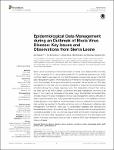Epidemiological Data Management during an Outbreak of Ebola Virus Disease: Key Issues and Observations from Sierra Leone
Owada, Kei
Eckmanns, Tim
Kamara, Kande-Bure O’Bai
Olu, Olushayo Oluseun
Sierra Leone experienced intense transmission of Ebola virus disease (EVD) from May 2014 to November 2015 during which a total of 8,704 confirmed cases and over 3,589 confirmed deaths were reported. Our field observation showed many issues in the EVD data management system, which may have contributed to the magnitude and long duration of the outbreak. In this perspective article, we explain the key issues with EVD data management in the field, and the resulting obstacles in analyzing key epidemiological indicators during the outbreak response work. Our observation showed that, during the latter part of the EVD outbreak, surveillance and data management improved at all levels in the country as compared to the earlier stage. We identified incomplete filling and late arrival of the case investigation forms at data management centers, difficulties in detecting double entries and merging identified double entries in the database, and lack of clear process of how death of confirmed cases in holding, treatment, and community care centers are reported to the data centers as some of challenges to effective data management. Furthermore, there was no consolidated database that captured and linked all data sources in a structured way. We propose development of a new application tool easily adaptable to new occurrences, regular data harmonization meetings between national and district data management teams, and establishment of a data quality audit system to assure good quality data as ways to improve EVD data management during future outbreaks.
No license information

